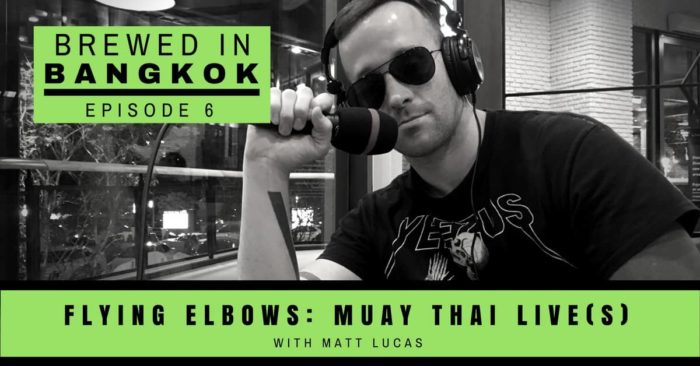
Muay Thai boxer, author, and TV commentator Matt Lucas and I sit down over a cup of over-brewed Chai tea to talk about the Muay Thai community’s world of flying elbows. Matt shares his unique insights into the lives of local and foreign Muay Thai fighters – from their early days to the sunset of their careers.
Show Notes
- Karsten talks about his inability to brew tea (00:28)
- Matt’s work as a TV commentator (01:15)
- The Boxer’s Soliloquy (08:51)
- Not owning a gym as a career path (11:05)
- Muay Thai writing and blogging (12:00)
- Fighting in your 30’s (13:40)
- Career, life and earnings of a typical Muay Thai fighter (15:57)
- Matt’s life and origins in the US (24:50)
- Gyms, contracts, relationships and conflicts of interest (25:55)
- Matt’s journey to Muay Thai(land) (34:05)
- Matt’s stencil graffiti art (37:00)
- Where and when to see Matt fight (and comment) (40:20)
Websites and People Mentioned
- The Boxer’s Soliloquy is Matt’s book that features short stories set in the Muay Thai world. I gave it a verified-purchase 5-stars on Amazon.
- Matt Lucas is his personal website with links to his other writings and work.
Transcript
Welcome to Brewed in Bangkok, the podcast about the people you need in the city that makes a hard man crumble.
Karsten: Hey! It’s brewed in Bangkok and I’m your host Karsten Aichholz. Today we have a very special guest; it’s a bit of a television celebrity and a published author. We’ll get to my interview with him very soon.
I’m a little bit hyped up today because I am a few cups of coffee into the very nice Blue Morning Coffee I picked up. So I got a food scale and I actually use it to measure food. I didn’t know you would use it for anything else until I had a couch surfer of once see it, his eyes lighted up and it’s like whooooa! I was like ‘it’s a food scale’ he was like “you use it for food, I thought you are using it for something else we can consume in small quantities” and that’s when it dawned on me like oh right drug dealers need to somehow measure the produce put it exactly.
Anyway I use it to measure the amount of ground of coffee I put into my coffees. So I hope that given some time that will actually result in determining the perfect amount of coffee that I have to put in, in order to get the best taste out of it.
However for this interview, we also went to drink coffee and taste wasn’t the priority though I actually do like it there. Let’s find out what we went.
Hi this is Karsten Aichholz from Brewed in Bangkok and I’m sitting in Star Bucks with Matt Lucas.
Matt: Cool
Karsten: Well we haven’t drunken anything yet except for water and coffee and what is it that you have there?
Matt: I have a nice cup of cha over here, it’s brewing.
Karsten: Did you leave the tea bag in?
Matt: Yeah, you’re not supposed to?
Karsten: I think like you know I had a thing actually. When I started my business, I was living with my business partner and it was like a running joke that I had to make every cup of tea three times, because the first two times I would totally forget about it and it would lead like brew literally for 20 minutes at which point it just becomes this disgusting bitter mess and the whole process would start over until the third time I just finally set a timer, like 5 minutes timer.
Matt: It does make sense. I never really realized why tea tasted so bitter all the time.
Karsten: Laugh. OK. You know I was thinking I should actually write down an introduction to you know what I actually want to say and I always mess that up with. Oh well I’ll record another one later on like when I sit at my home alone, I’ll be creative and structured in my approach to this. Thank you.
Matt: It sounds good.
Karsten: Oh cool, right. So Matt you’re famous.
How many times per week are you on television?
Matt: About three times a week, so I work at Max Muay Thai as a English language commentator on Friday, Saturday and Sunday nights.
Karsten: So you comment about fights.
Matt: Yes
Karsten: Do people give you a lot of shit about commenting?
Matt: Hmm….I think you might be the only one so far. (Laughs)
Karsten: Even when I sit at home, I don’t watch Muay Thai fights at least not common in English. I just see it when I watch soccer right. And there’s like this universal sentiment that people commenting soccer matches suck.
Matt: Yeah I think that’s basically across the board, definitely other people give a lot of flak to fight commentators. Joe Rogan or whoever is behind the mike is always an idiot. And in this case I get to be that idiot.
Karsten: So what is the criticism usually like?
Matt: Uhm…People usually criticize Thai commentators would have a bias. This Muay Thai fight commentator Vinnie Sharman is very much enthralled with a couple of English fighters that he knows very well. Vinnie is actually a good commentator but he also gets that sort of negative criticism sometimes. I think its general across the board; sports commentating, negative reviews like ‘oh! He’s so biased, he doesn’t know what he’s talking about’…
Karsten: Well I’m just thinking myself like what kind of expectations do people have I mean… ‘he’s kicking the ball, he’s hitting his head’. There’s only so much you can say about that. Right?
Matt: Exactly!
Karsten: So do you like try to come up with new things.
Matt: I do sometimes, I try and brainstorm occasionally. I try and watch fights and listen to other commentators. My co-commentator Rob Cox is much more experienced than me. He’s been commentating and doing Muay Thai journalism for the last 10+ years. So he mainly sticks to sort of play-by-play commentating, but also other commentators like say Vinny Sharman will talk about the person’s characteristics, sort of their past a bit more and that can be interesting too. But you know you watch it fights all the time so it can get sometimes repetitive, but as a commentator the whole point is you’re bringing excitement; you’re trying to bring something new to the show and that can definitely require some work. Just like any sort of public performance requires work.
Karsten: How long have you been doing this?
Matt: It’s been about six or seven months now. I started at Max in January, we were just doing two shows a week on Saturdays say have a 4-man tournament. Four Thai fighters battling it out for a grand prize of 50,000 baht; then on Sunday there’s 7 bouts of foreigners versus Thais.
Karsten: which one gets the higher quota?
Matt: like the more viewers?
Karsten: Yeah
Matt: Usually it’s Sunday nights. People like to watch the foreigners duke it out with the Thais. The stadium gets a bit more packed, people get into a bit more. But, the Saturday night shows can also be very exciting. Sort of depends on the fighters in the ring, just all around you know sometimes you can have a boring ass guy from Germany or England and an exciting Thai fighter would be fighting on the Saturday show.
Karsten: What does a boring fighter look like?
Matt: The max format is definitely geared towards aggression and excitement. So usually you want a fighter that is very aggressive and likes to bang. Sort of willing to stand in front of opponents and take some shots, give some shots, not really backing down. A lot of major stadiums realize a bit more on points. So you can fight very safely without really damaging yourself or getting damage and sort of backing away from your opponents using the ring to sort of evade whereas at max, they want you to press forward, they score aggression pretty highly.
Karsten: Have you yourself had a learning journey as a commentator where you said OK at the beginning you commented in one way and that has developed over the months?
Matt: I think that more or less I’ve become a bit more comfortable speaking into the microphone. And I would say that I’m not always doing play by play stuff because Rob Cox my co-commentator is more focused on the Play-by-Play stuff so I try and add some other things. How someone that’s pushing their glove against their opponent’s face to make space in the clinch or a bit more tactical things just to add variety; I won’t to be repeating what Rob is saying all the time.
Karsten: Does it help you as a fighter to comment? Like that’s already stuff I know
Matt: Yeah it’s more or less stuff I know; I don’t think that it really helped me as a fighter. Yeah I don’t think so.
You know I think that you can definitely develop skills as a fighter by training someone, but not necessarily by commentating on fights.
Karsten: And for you, if you look at your persona in the fighting world, you’re now on television, people know you. Do they recognize you?
Matt: Occasionally I’ll get pictures taken with tourists in one night outside of the stadium, but not as often as the V.J. or the host. D.J. Poom or B.M Max. Definitely more than my commentator Rob Cox But I think that’s because I’m better looking.
Karsten: huh… who’s B.M.X?
Matt: B.M.X. is one of the hosts of the show; he usually works on Sunday nights with D.J Poom
Karsten: OK and they’re the Thai hosts right?
Matt: They’re the Thai hosts, a bit more like on the camera. Whereas Rob and I sit ringside looking at the fights, commentating which you’ll hear on your T.V.
Karsten: But they don’t see you…
Matt: But they don’t see me… You can see me ringside, I usually sit by the red corner. So when the camera pans over to the red corner, you can see me sitting there talking at the fighters, thinking of something eloquent to say.
Karsten: And you succeed?
Matt: Often
(Laughs)
Karsten: Ok, you were actually speaking eloquent right. You do not only speak, you write.
Matt: Yeah.
Karsten: Occasionally you wrote a book
Matt: I did write a book, I wrote a book called The Boxers Soliloquy
Karsten: How long did you have to practice to pronounce that?
Matt: (laughs) quite a while. Actually the real problem was spelling soliloquy correctly, that took much longer.
Karsten: How did you pick the title?
Matt: The title comes from the title story in the book although I wouldn’t necessarily say it’s a stronger story, but I thought it was a fitting title to the book. It’s a bit unique of a title, maybe a bit hard to search in Google for but you know… whatever…
The book itself is composed of series of interconnected short stories about fighters in America and coming to Thailand training and fighting. It’s about their jobs, their relationships; sort of talks about themselves. So I felt so-li-lo…quy…
Karsten: Getting there? (Laughs)
Matt: (Laughs) It is hard to say…would be a fitting title for it
Karsten: Is it an autobiographical account or is it like what you see from friends or….?
Matt: yeah it’s not autobiographical. Although some of the experiences are drawn from my own life. I am from America, I have worked…. you know for example one of the characters in the book works at a restaurant I spent a long time working as a waiter and bartender at several restaurants and of course I’ve saved up money, I’ve traveled here to Thailand, I’ve fought out here. So in some degrees like the experiences of the characters in the book are similar to mine but not always like one character has children; I’ve never had children. Another character owns a gym; I don’t own a gym… You know things like…
Karsten: Would you want to?
Matt: I don’t think so actually
Karsten: Owning a gym, isn’t that kind of the traditional career path?
Matt: Yeah it is definitely the traditional career path. I wouldn’t mind working for someone that owned the gym.
Karsten: Why’s that?
Matt: I’m just not that motivated. I think owning your own business is a lot of work and I don’t really like to work that much.
Karsten: So do you think that people who do open gyms know what they’re doing?
Matt: No! (Laughs) Not all the time, I think that sometimes they’re just motivated to open a gym and you know.
Karsten: For lack of any other ideas?
Matt: Yes.
Karsten: What about…. I mean the new gym opening might be the Muay Thai blogging. I recently wrote a little bit about Muay Thai and I noticed how many blogs there; how many people write about Muay Thai and I mean obviously you have these blogging communities in a lot of different fields. But what strikes me as odd is that at the same time everybody in Muay Thai talks about how there is no money in it for anybody; yet there’s so many people who write about it.
Matt: Yeah I’m not sure why people do. You know obviously I write about it and there is very little money in it.
Karnsten: What was your motivation?
Matt: When I write or do something it’s because I feel like the content isn’t out there and it’s something that I would want to read. So the book that I wrote the boxer soliloquy, I didn’t really write for anyone else. I wrote it because I want to read a book like it.
Karsten: But at the same time you said you not really the most motivated person.
Matt: No, no, no, no… I don’t like to work. I would say I’m pretty motivated but …
Karsten: Putting a book together is a lot of work.
Matt: I don’t know. I don’t like to work for other people.
Karsten: OK so what would you like to do in the future?
Matt: Well I’m going spend this year trying to get some fights. Right now I’m 34. So I probably can’t biologically fight for much longer.
Karsten: Why’s that?
Matt: Because your body slows down.
Karsten: Can’t you fight against other grandpas
Matt: Yeah you can but you know that the majority of people fighting our game be in their early 20’s. And just sort of speed, their recovery rate, their ability to cut weight is going to be a lot better than a 30, 40 year old.
Karsten: Ability to cut weight?
Matt: Yeah…Muay Thai is a weight-specific sport, right. And so a 20 year old can much more easily cut 5 to 6 kilos than say 34 year old.
Karsten: Why’s that? Little interest here.
Matt: Yeah. So just your body metabolism has an easier time of cutting the weight. Your metabolism tends to slow down as you get older.
Karsten: Can’t you just do like more running or more punching or less eating?
Matt: You can. But it still becomes harder like it’s more of an uphill battle to cut those 5kilos when you’re 35 versus when you’re 25. So and then, you can still do it but it’s like you have to spend that extra hour or two every day working out or making sure you’re eating right and that work is just compounds and it can be more difficult.
Karsten: So no more fighting?
Matt: Yeah maybe in a year or so.
Karsten: So what is it that you would give up when you stop fighting?
Matt: Just getting into the ring and fighting. I’ll probably still train quite regularly, right now I train about 20 hours or more a week.
Karsten: That is a lot. Is that normal, average or little?
Matt: I would say most Thai fighters are training about 5 hours a day, 6 days a week so you know out here at least. So the average Muay Thai fighters train about 30 hours a week. It’s a full time job.
Karsten: But the full time job implies that you’re getting a salary. (laughs)
Matt: Yeah. Well they get their salary from their fights. That’s when they perform, that’s when everything that they’ve been doing for the last 3 or 4 weeks shows.
Karsten: But how much money do they make? Leaving aside the superstars you know if you’re reasonably good Thai Guy, how long is your active career? And how much do you expect to make before you start driving taxis in Bangkok.
Matt: Most Muay Thai fighters will start off pretty young. They’ll start off like 8 years old, 9 years old, 10 or 12. They’ll start fighting at small sort of village fights at which point they’ll be making like. Maybe a thousand baht, six hundred or five hundred baht at age ten.
Karsten: Hmm…That’s good money for a 10 year old.
Matt: yeah it’s good money. You know we can definitely help out the parents. Most fighters are from poorer areas Isan or south, so it can definitely help out.
Karsten: Is that the reason why the parents send them to go fight so you can help pay for the farm?
Matt: I think sometimes, I think definitely there’s economic motivation. There’s also not a lot to do in those areas you know Muay Thai earns increases to some degree.
Karsten: OK. So from there the money increases.
Matt: Yeah. Usually most fighters if they’re good and doing well will come to Bangkok, stay at a major gym or like an established gym and from there make the majority of their money fighting at the big stadiums like Lumpini, Ratchadamnoen and maybe Channel seven. So some of the guys F.A. group that gym I currently train at, it’s up by Chatuchak Park behind Channel Seven stadium. They make about 20 thousand per fight. They will fight about once a month and you know they’re fighting regularly at Lumpini and Ratchadamnoen. Some of them are ranked some of them are not.
Karsten: But that’s like a ballpark twenty thousand baht a month for a good fighter and how many of… I mean is that the top hundred fighters in the country, the top thousand?
Matt: Maybe top thousand.
Karsten: OK so the top thousand people stand to make about twenty thousand. And how long are they active?
Matt: Now Thai fighters can fight I would say into their mid twenty’s at which point the whole need to start fighting internationally if they’re able to wait.
Karsten: Like when they get too old for the Thai market they have to fight internationally?
Matt: Well you know because the sport is still growing internationally, most international fighters are not as good as the Thai fighters; they just don’t have the same amount of ring experience. So if they have had a decent career here in Thailand and made a decent name for themselves and have connections they can go overseas or to China, Japan, Europe or Australia and fight over there. Fight the foreign fighters and do quite well
Karsten: But they have to do the Thai thing first. They can’t just get up and say “you know what, I’ll just go to the….” I mean it sounds like there is a bit of a shortcut there you can do this.
Matt: Yeah. They basically will need to have had some fair amount of experience here in Thailand first.
Karsten: So they have maybe five, six, seven years of active work here and then they have a chance to work for a few more years abroad. And then it’s become a Muay Thai teacher.
Matt: Yeah basically. I mean even the very best guys like Petchboonchu. Recently some may have become Muay Thai teachers at a gym in Singapore called Evolve and they get paid pretty handsomely. And there they’re like the top tier guys.
Karsten: Kind of where the name brings in students.
Matt: Yeah exactly. That’s a marketing scheme of Evolve. It’s like we have champions to teach you how to fight and kick and punch.
Karsten: What about everybody else? Like I mean ten years after do you hear about what happens to them?
Matt: I mean most people would sort of end up going home. Sadly, a lot of people don’t always save money or have fruitlessly spent it. So you know they end up as like tuk tuk drivers or basic laborers.
Karsten: Are you close or do you know with any Thai fighters who were active ten years ago and now no longer?
Matt: I do know some, most of the ones I still know have become trainers to some degree but you know not a ton. Just because like over the last eight or nine years I’ve been in and out of Thailand. So I haven’t made like super long connections but yeah there’s not a huge future for Muay Thai fighters. But you know to be honest they don’t really have a big future to start off with.
Karsten: Matt, what you’re saying is that when these kids start out they’re usually in the area where there’s either nothing else to do or no opportunities.
Matt: Exactly
Karsten: So do you think I mean that basically sets them up for a path of Muay Thai.
Matt: Yeah.
Karsten: And do you think that’s good?
Matt: I mean not really. I think Muay Thai is better than farming Rice. But you know there’s just not enough options for people in poor areas. You know the education option is pretty abysmal. I think if your parents don’t have money, it’s going to be really hard to get yourself educated, to go to a good college, to land a good job. You know you’re not going to have the same connections.
Karsten: So do those kids. I mean in the West you have sometimes have these sports academy where kids train or teenagers train very long hours with some kind of adapted curriculum so they still get their degrees or you know it’s like actors basically you know where they have a high school equivalent degree or is there such a thing in Thailand like do these Muay Thai go to school in one form or another.
Matt: Yeah. Some kids will still go to school while they are actively training and fighting. But a lot of them don’t. They basically become full time workers when they’re thirteen or fourteen.
Karsten: So they finish elementary school and then they become a fighter full time.
Matt: Yes
Karsten: And they drop out because of Muay Thai or they do Muay Thai because they would be dropping out anyway?
Matt: One way or the other. I don’t know the specific/statistics but I think that it’s more or less true.
Karsten: Sounds a bit sinister.
Matt: (Laughs) Yeah… I wouldn’t want to be poor here in Thailand or for that matter anywhere.
Karsten: You are from the US.
Matt: Yes.
Karsten: And you were born in the US
Matt: Uhmm Uhmm
Karsten: How many years have you lived there?
Matt: I was born in 1981, I’m 34 now. I have lived the majority of my life in America. I grew up in Upstate, New York in a rural town outside of Albany. So when I describe it to people out here I actually describe it as similar to Isan: Lots of tractors, lots of cows, there’s corn instead of rice. But you know there’s a lot of similar cultural things, people don’t really leave town that much; most of my classmates are still living there. I went to college for a short while and then got kicked out. I made my way to California where after a bit I became involved in Muay Thai.
Karsten: You grew up in that countryside and then you end up being in the countryside in Thailand.
Matt: Well I live in Bangkok so it’s not quite the countryside.
Karsten: Did you train did you train in Bangkok when you first came here?
Matt: Tes.
Karsten: You’ve never been to these… because I’ve heard it’s the countryside gyms that they are like the tough ones.
Matt: Yeah but I think it depends gym to gym. I’ve definitely been to countryside gyms that are very tough. I’ve also been to countryside gyms that are bit more lax.
Karsten: What’s lax in the context? Four hours a day or….
Matt: They are more like two or they won’t necessarily push the fighters as hard or the training is just not as intense. So usually the Bangkok gyms are tend to be a bit more intense than the countryside gyms.
Karsten: You told me about the fighters getting pushed. So from what I understand the fighters stay at the gym, they live in the gym and they eat there they train there and do they pay for that?
Matt: Generally a Thai fighter will have a contract with the gym. It’s about a five year contract more or less depending on the individual and the gym gets half their purse. So it’s in the gym’s interests to sort of have highly developed fighters with big purses.
Karsten: So they get pushed
Matt: So they get pushed. And so if you are a good fighter, I will try and push you more to become a great fighter that way instead of making only 60,000 Baht per fight, you’re making 80 because I’m getting half of that. So I want 40,000 Baht a month from you rather than 30.
Karsten: Do you think there can be like a conflict of interest where it might not be in the best interest of the fighters.
Matt: Definitely
Karsten: How does that look?
Matt: Sometimes you’ll see gym owners mismatching the fighters
Karsten: On purpose?
Matt: Maybe not on purpose but definitely economically motivated. So it’s like maybe you fought for a while and you haven’t been doing that well in your last couple fights but I want that money from you. So I match you up with someone because I want that 30,000 Baht. And really you should be taking like a month or two off or maybe having an easier fight where maybe you’re only making like five thousand Baht. I match you up with that 60,000 Baht fighter because I want that 30 when really you should be fighting for less money or not at all.
Karsten: And do the fighters know? I mean what do you know? Like you trust your gym to match you up, you probably don’t know who you’re fighting right?
Matt: Well I think definitely foreign fighters it’s harder for them to know who they’re fighting. I think that to some degree that Thai fighters will have a little more insight just having been around the game for a while longer. But I think it’s a complicated situation because your gym owner is to some degree your boss. He’s also your family because you’re living there; you’re living at his property, you’re eating with him, you’re sleeping in the same house with him. You’re sleeping next to all the other fighters, your trainer generally lives in the same house as you. So it becomes a bit more complicated to be like well you know “Old man has send me up here but he’s also feeding me”
Karsten: So, the fighters don’t want to say no.
Matt: Yeah I think it becomes difficult to say no or to sort of always voice for your best interests.
Karsten: Is that because for financial reasons? Or because if they say no then they get kicked out of the gym and no one else will take them? Or because they don’t want to upset the Dad so to speak?
Matt: I think both issues. If you break a contract with a gym; so if like I’m on a five year contract with F.A. group or something and then I walk out of that contract; I can’t create a new contract with a new gym. I’m basically blacklisted for the remaining time of my contract. So if I walk out after three years, that means for two years I can’t sign a new contract and in that two years, my body will age, my technical abilities might fall, I won’t have as much ring experience etc.
It is not in the best interests generally for fighters to walk away from the contract and have their relationship and also you don’t necessarily want be upsetting dad.
Karsten: Is that I mean contracts usually a lot when people hear about talent they don’t think about things being as much regulated by paper than by other things. So, how does contract enforcement look does the fighter in the gym hire a lawyer and then they go to this district court or…?
Matt: Well that’s definitely happened in the past, most notably with Buakaw who is probably the world’s most famous Muay Thai fighter. He had issues with his gym owner Por Pramuk; he was having issues with his gym owner taking too much of his purse or not giving him enough of the cut.
Karsten: OK, for normal small time gym; is it more of industry reputation that the gym owners know each other like ‘OK it’s your guy and you don’t touch him while he’s under my contract’?
Matt: More or less.
Karsten: Do people get like drafted up?
Matt: I don’t think so. Although I am not that close to inside information on those sorts of things; a lot of times dispute with gyms sort of like it always seems like there’s more than one side to story. And it’s always unclear as to whose side is necessarily true or truer.
Karsten: Is it like a lot of gossip?
Matt: Yeah sometimes.
Karsten: Like I mean a fighter sitting around and gossiping?
Matt: Yeah. I think that at least I’ve heard more from foreign fighters gossiping. But that’s also because I can speak English much better than I can speak Thai. So maybe when my Thai gets better I’ll hear more Thai people gossiping.
Karsten: What do people gossip about?
Matt: You know people will gossip about like training at certain gyms like ‘oh X gym was good, Y gym was bad…blah blah blah; Oh this fighter is lazy, this fighter is good’ that sort of stuff.
Karsten: So you were talking earlier about your journey from the U.S. to Thailand. You grew up in Upstate New York, moved to California and then started Muay Thai.
Matt: Yeah more or less so. I was working in a restaurant; I didn’t want to go to school and finish out my College degree. So I didn’t really know what I want to do with myself, I was like 24, 25. You know I definitely drink a lot; that was fun for a while but I felt like I needed to be doing something else especially working in a restaurant there’s definitely a big culture of drinking.
So I started going to a Muay Thai gym, and I went one day and then I went the next. Then I started going all the time. I saw an interclub fight and I decided ‘oh I should try that’.
Karsten: So you got started with Muay Thai when you were 24, you didn’t fight before?
Matt: No I was actually never athletic before I started doing Muay Thai, I never really ran, never really played high school sports, sort of dorky kid just hung out… no sports really.
Karsten: And then got into Muay Thai and from there too?
Matt: Yeah. So I had a few of these interclub fights and had an amateur fight or two in America and I was like well I’ve never been abroad before, I should go to Thailand and train in Thailand.
Karsten: Like from never being abroad ever before you like ‘I’m going to do that getting hit in the face in Asia basically’
Matt: So, I saved up money and I went to Thai Language school at a local temple. So I learned some basic Thai and then I got on a plane and went to Bangkok. I trained and I fought in Pattaya actually, then I went back home after 3 months of training here in Thailand and I was like well ‘what do I do now’?
I sort of like going out there and training and fighting, it was interesting. I learnt a lot about Thailand culturally and I was like ‘oh I should keep doing this’. So it’s been 8 or 9 years since I’ve been training and fighting still, learning Thai and living the dream.
Karsten: And up next is art.
Matt: So I think as my fight career comes to a close, some sort of thinking more and more about what my future plans are. I was doing a lot of stencil arts, sort of graffiti style stencils. In America, I actually had an art show that was all Muay Thai themes. Muay Thai stenciled arts.
So I’m thinking about doing that more in the future, especially because I feel like the art world here in Bangkok is relatively easy to break into.
Karsten: What makes you think that?
Matt: I think just because it’s a smaller country.
Karsten: I mean it’s a tough assertion, I see a lot of artists out there are like ‘I’ve tried I haven’t made it…’ (laughs)
Matt: Maybe I’m overconfident or very much believe in myself.
Karsten: Well that’s a good start
Matt: I also feel like I have these decent stencil graffiti skills, I can make more or less Banksy style graffiti pretty easily like ecstatically on that level. And I actually don’t think that Banksy is ecstatically that complicated, so I feel like I can do that better. So I think we’ll see what happens in the future though.
Karsten: I do remember I had a friend here who was playing around with stencil and he took a picture of Mao, Cultural Revolution Leader in China and crossed out his eyes like a dead guy; below the image he put a text in Thai Mao Laew (both laughs). I think there’s like one copy of T shirt that exists, I wouldn’t recommend wearing it around any Chinese speaking.(laughs)
Matt: That is funny though.
Karsten: I mean there’s a lot of that going on right, if you look at T. shirts. Everybody has been always been joking about ‘oh you go to Thailand you have a T-shirt export business’. It’s kind of a thing.
Just 2 years ago met someone who actually did raise eight-figure US for a T-shirt start up, printing T-shirts.
Matt: Wow… that’s impressive
Karsten: Yeah I mean, just because people say that has been done, there’s always a new opportunity.
Matt: Yeah for sure.
Karsten: Well I’ll be looking forward to see the Banksy level art coming out of Bangkok and crushing the local art scene.
Matt: You might have to wait a while; I’m still doing the fighting so it would be a year or two.
Karsten: If we want to see you fight, how do we go about that?
Matt: So my upcoming fight on the 20th will be at Max Muay Thai in Pattaya. It’s on Monday night.
Karsten: Is there like an announcement somewhere online?
Matt: No, this is a lower level fight. I’m still trying to gain a bit more experience, but eventually I will probably fight on the televised shows which are on Sunday nights and those are a bit better advertised.
Karsten: If you want to hear you, it’s Max?
Matt: Yes.
Karsten: How do you find that on a channel like that.
Matt: So you can watch every night or every Friday, Saturday, Sunday night around 7:20 P.M. goes through about 10 pm on Channel eight here in Thailand. You can also watch Max Muay Thai on You Tube and they have their own website or YouTube channel and it’s also commonly on the channel 8 YouTube channel
Karsten: And the English track will be provided by?
Matt: Usually you’ll need to watch the English track live here in Thailand although that might change in the future.
Karsten: OK well I’ll be checking it out for sure. Thank you very much.
Matt: Yeah. Thank you.
And that’s it from Brewed in Bangkok for this episode. If you like the show, please go to iTunes and leave a five star rating. If you would like to find out more about the show you can go to brewedinbangkok.com and the website will redirect you to more information about the podcast, show notes and more background information about our guests and anything else you want to know about the show or me. Until next time.
Want More?
Check out the complete collection of Brewed in Bangkok episodes. Matt also put together some Muay Thai training recommendations for people coming to Bangkok as well as a collection of his favorite bookstores in Bangkok.
You can also check out our article on personal trainer in Bangkok, 17 jobs you can do as a foreigner in Thailand, cost of living in Thailand, and Thailand travel insurance.





